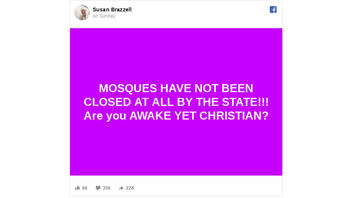
Are Islamic mosques being permitted to stay open while churches are being forced to stay closed due to the novel coronavirus? No, that's not true: In states where closures are enforced, all houses of worship must close, without exception. In states where governors have allowed houses of worship to decide whether to close, all churches, mosques and synagogues can choose to open their doors. No religious preference is being shown.
The claim appeared in various Facebook memes, including a post by Susan Brazell (archived here) on April 12, 2020, under the title "MOSQUES HAVE NOT BEEN CLOSED AT ALL BY THE STATE!!! Are you AWAKE YET CHRISTIAN?"
This is what the post looked like on Facebook at the time of writing:
The user is mistaken, according to various reports and officials. According to an April 2, 2020, program on CNBC, Christian and other places of worship are staying open in some states even though the coronavirus spread is particularly risky in their areas given the size of their older population. The story read, in part:
In the 15 most vulnerable states identified by the Kaiser Family Foundation, a national nonprofit that studies health issues, more than four in 10 adult residents are 65 or older or have an underlying medical condition.
While most cases of COVID-19 are mild, the Centers for Disease Control and Prevention have said people who fall into those two categories are more at risk of serious illness from the disease, with the most critical cases requiring intensive care and the use of medical ventilators, which are now in short supply.
Florida Gov. Ron DeSantis became the latest state leader to allow for religious exemptions to a shelter-in-place order on Wednesday.
DeSantis's order listed "religious services conducted in churches, synagogues and houses of worship" among the "essential activities" that are allowed to stay open.
Other particularly vulnerable states with special exemptions for religious activities include Louisiana, Tennessee, West Virginia, New Hampshire, Delaware, Michigan and Mississippi. In Oklahoma, Missouri and Arkansas, there are no statewide orders closing nonessential businesses."
Some of those states have clamped down since that story ran. Still, if anything, Islamic leaders have turned to restricting group prayers to protect the safety of Muslim families. The Islamic Society of New Hampshire, for its part, voluntarily closed its doors to protect worshippers. A pop-up on the site states:
The Islamic Society of New Hampshire Board of Trustees has suspended all activities including Jumu'ah (Friday prayers) until further notice. Our doors will be locked and no one will be allowed in. We will take our decisions for Jumu'ah (Friday Prayer) on a week-by-week basis.
Sunday school has also been suspended as well as our five daily prayers. Please complete your prayer at home. Please note that this decision was not taken lightly and is being done for the safety and security of our community."
The Islamic Medical Association of North America, with other Islamic health organizations, issued this policy statement:
We strongly recommend the Muslim community to take precautions, including but not limited to suspending daily congregational prayers, Sunday school, Jumuah prayers and other gatherings in your communities and mosques temporarily. Preservation of human life and human rights is far more significant than continuity of even essential practices of devotion."
Kentucky is an example of a state where all houses of worship equally fall under the no-mass-gathering mandate. Gov. Andy Beshear, with the Department of Public Health, on March 19, 2020, banned all mass gatherings, including faith-based gatherings with no exceptions.
To reduce and slow the spread of COVID-19, all mass gatherings are hereby prohibited. Mass gatherings include any event or convening that brings together groups of individuals, including, but not limited to, community, civic, public, leisure, faith-based, or sporting events; parades; concerts; festivals; conventions; fundraisers; and similar activities"
ABC News reported that four governors -- in Michigan, Kansas, Ohio and New Mexico -- who were leery of seeming to trample religious rights, exempted or partially excluded religion-based gatherings from COVID-19-related stay-at-home orders.
On March 29, the network reported that governors in Michigan, Kansas, New York and Louisiana were nervous. But leaving churches and mosques open while closing businesses, such as theaters, can have serious consequences for a congregation.
Rachel Laser, the president and CEO of the nonprofit advocacy group Americans United for the Separation of Church and State, said that governors are misinterpreting restrictions on religious expression.
The Constitution, she said, actually requires religious and secular institutions be treated the same:
The Constitution not only permits it, but demands it. Such restrictions do not violate religious freedom; they ensure religious freedom is not misused in ways that risk people's lives."
Laser's organization has tracked mass gathering bans by state and cities and recorded numerous instances in which COVID-19 has spread through congregations, sometimes resulting in deaths.
















